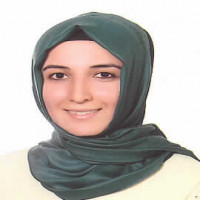Research Article
Issue Editorial Board









 Web
Web

EMPLOYMENT HISTORY
2019 – Present
National University of Civil Protection of Ukraine
Assistant professor. Department of Applied Mechanics and Environmental Protection Technologies.
2011-2019
A. N. Podgorny Institute for Mechanical Engineering Problems of the National Academy of Sciences of Ukraine
Environmental engineer.
EDUCATION
2019 – PhD diploma №052776. The title of the thesis is “The groundwater level forecasting and management for increasing the ecological safety of the built up territories of Ukraine”.
2009 – 2012
Kharkiv National Academy of Municipal Economy
PhD program of ecological safety.
Emphasis: Groundwater of the urban territories
2008-2009
Kharkiv National Academy of Municipal Economy, Kharkiv, Ukraine - MSc in Ecology
Department of Urban Environmental Engineering and Management, Kharkiv, Ukraine
2004-2008
Kharkiv National Academy of Municipal Economy, Kharkiv, Ukraine - BSc in Ecology
Department of Urban Environmental Engineering and Management, Kharkiv, Ukraine




I'm a Fluid Mechanics enthusiast, a researcher by profession, and a teacher by passion. My work primarily revolves around the applications of Physics and Mathematics in Engineering.
Aim & Scope
The Journal of Mathematical Sciences and Modelling (JMSM) endeavors to establish a connection between mathematical reasoning and real-world challenges. Our primary aim is to foster interdisciplinary collaboration by employing mathematical methods to bridge gaps between various disciplines and shed light on intricate problems. Through our journal, we seek to disseminate innovative research, comprehensive studies, and practical applications that effectively address real-world problems utilizing mathematical modeling and simulation techniques. Furthermore, we aim to demonstrate the pervasive impact of mathematical thinking in everyday life, with a specific focus on highlighting the educational and industrial applications of mathematical modeling. The Journal of Mathematical Sciences and Modelling serves as a prominent platform for mathematicians, engineers, scientists, and researchers across different fields, facilitating interdisciplinary collaboration and sharing novel advancements in the field of mathematical modeling. Ultimately, our mission is to contribute to the progress of science by seamlessly integrating both the practical and theoretical aspects of mathematical modeling.
The scope of the JMSM is devoted to mathematical modelling with sufficiently advanced models, and the works studying mainly the existence and stability of stationary points of ODE systems without applications are not considered. The scope of the journal also includes applied mathematics and mathematical analysis in the context of its applications to real-world problems. The journal is essentially functioning on the basis of topical issues representing active areas of research. Journal publishes research articles and reviews within the whole field of mathematical modelling, and it will continue to provide information on the latest trends and developments in this ever-expanding subject.
Author Guidelines
Manuscript Submission
a) All articles must be written in English.
b) The submitted article is the original work of the author(s), and they do not plagiarize,
c) All authors have participated in this study individually, and they take all responsibility for this study.
d) All authors have seen and approved the final version of the submitted article,
e) The article has not been published elsewhere or submitted for publication,
Please follow the hyperlink “Submit a Manuscript” on the right and upload all of your manuscript files following the instructions on the screen.
Permissions
Authors who wish to include figures, tables or text fragments that have been previously published elsewhere should definitely cite the relevant place in the article. If not cited, they must obtain permission from the copyright holder(s) for the relevant portion and include proof of such permission when submitting their manuscript. Without such proof, any material cited will be assumed to belong to the authors.
Title Page
The title page must include:
- The name(s) and surname(s) of the author(s)
- A concise and informative title
- The affiliation(s) and address(es) of the author(s)
- The e-mail address(es) of the of all author(s)
- The 16-digit ORCID of the author(s)
Abstract
Please provide an abstract of a maximum of 500 words. The abstract should not contain any undefined abbreviations or unspecified references.
Keywords
Please provide at least three keywords that can be used for indexing purposes.
Text Formatting
Manuscripts must be sent as Pdf when uploaded to the system for the first time. However, if the article is accepted, it should upload the Latex file written in Journal format and figure files, if any, to the system. Please use the Journal of Mathematical Sciences and Modelling LaTeX macro package.
Please download the source files by right-clicking on the link and choosing save as.
jmsm.tex (Change the name of the Tex file to "jmsm")
jmsm.cls (Change the name of the Cls file to "jmsm")
logo (Change the name of the logo file to "logo")
cover (Change the name of the cover file to "jmsm_Cover")
Creative Common (Change the name of the Creative Common file to "cc")
Headings
Please use the decimal system of headings with no more than three levels.
Abbreviations
Abbreviations should be defined at first mention and used consistently thereafter.
Article Information
Fill in the Article information section in the latex file completely.
Reference List
References should be listed and numbered in the order that they appear in the text. In the text, citations should be indicated by the reference number in brackets [1]. The list of references should only include works that are cited in the text and that have been published or accepted for publication. Personal communications and unpublished works should only be mentioned in the text. Do not use footnotes or endnotes as a substitute for a reference list.
Journal Article
A. N. Kochubei, Extensions of symmetric operators and symmetric binary relations, Mat. Zametki, 17 (1975), 41-48.
M. I. Gil’, On the stability of linear Barbashin type integro-differential equations, Math. Probl. Eng., (2015), Article ID 962565, 5 pages.
M. Gil’, Stability conditions for non-autonomous linear differential equations in a Hilbert space via commutators, Fun. J. Math. Appl., 1(1) (2018), 6-11.
Unpublished Article
R. Lopez, Differential Geometry of curves and surfaces in Lorentz-Minkowski space, (2008), arXiv:0810.3351v1 [math.DG].
M. Akyigit, Split Fibonacci quaternions, Adv. App. Clifford Alg., (in press).
PhD Thesis
E. E. Kara, On matrix transformations between some sequence spaces and the Hausdorff measure of noncompactness, Ph.D. Thesis, Sakarya University, 2012.
Book
M. Bohner, A. Peterson, (Eds.), Advances in Dynamic Equations on Time Scales, Birkhäuser, Boston, 2003.
Conference Proceeding
K. G. Tay, S. L. Kek, Approximating the smallest eigenvalue using inverse method through spreadsheet Excel, Proceeding of the 17th National Symposium on Mathematical Science (SKSM 2009), (2009), 653-658.
Notes:
1. Please use “L. Fibonacci” instead of “Leonardo Fibonacci”
2. Please do not use "and" between the author's names.
3. The title of manuscript in the references must be italic and start with the capital letter.
4. It must be “30(8) (1922), 19-23.” instead of “Vol.30, No.8, 19-23, 1922” for articles.
Tables
- All tables are to be numbered using Arabic numerals
- Tables should always be cited in text in consecutive numerical order.
- For each table, please supply a table caption (title) explaining the components of the table.
- Identify any previously published material by giving the original source in the form of a reference at the end of the table caption.
- Footnotes to tables should be indicated by superscript lower-case letters (or asterisks for significance values and other statistical data) and included beneath the table body.
Classification Code
An appropriate number of MSC codes should be provided. The Mathematics Subject Classification (MSC) is used to categorize items covered by the two reviewing databases, Mathematical Reviews and Zentralblatt MATH.
Ethical Principles and Publication Policy
The publication policy of the Journal of Mathematical Sciences and Modelling (JMSM) is based on the improvement and dissemination of information in an impartial and respectful manner. The processes applied in line with this policy directly affect the quality of the studies submitted by authors and affiliated institutions.
JMSM adheres to national and international standards in research and publication ethics. It complies with the Press Law, the Law on Intellectual and Artistic Works, and the Higher Education Institutions Scientific Research and Publication Ethics Directive. JMSM has adopted the International Ethical Publishing Principles published by the Committee on Publication Ethics (COPE), Directory of Open Access Journals (DOAJ), Open Access Scholarly Publishers Association (OASPA).
The ethical duties and responsibilities listed below are based on the guidelines and policies published as open access by the Committee on Publication Ethics (COPE).
The publication of an article in a peer-reviewed journal is essential for the development of a coherent and respected knowledge network. Peer-reviewed articles support and develop scientific methods. Therefore, it is important for all relevant parties involved in the publishing process, including authors, journal editors, reviewers, and publishing agencies, to agree on the expected ethical behaviors and standards.
1. Ethical Principles
1. Authorship of the PaperAuthorship should be limited to those who have made a significant contribution to the conception, design, execution, or interpretation of the reported study. All those who have made significant contributions should be listed as co-authors. Where there are others who have participated in certain substantive aspects of the research project, they should be acknowledged or listed as contributors.
Reviewers: Referees should inform the journal editor about the evaluation process if they suspect any conflict of interest in the article they are evaluating and refuse article evaluation if necessary. In order to prevent conflict of interest, people in the institutions where the article authors are working cannot referee the article.
3. Data Access and Retention
Authors are asked to provide the raw data in connection with a paper for editorial review and should be prepared to provide public access to such data, if practicable, and should, in any event, be prepared to retain such data for a reasonable time after publication.
4. Data Fabrication and Falsification
Data fabrication: This is about generating research findings.
Data falsification: Manipulating research data to give a false impression. This includes manipulating images (eg, micrographs, gels, radiological images), removing outliers or "inappropriate" results, changing, adding, or skipping data points, etc. are included. Technically the Image can be improved for the readability of the images. However, if there is such an improvement, the editor should be informed when the article is sent to the journal and the article should also be included.
Proper technical manipulation means adjusting the contrast and/or brightness or color balance if applied to the full digital image (not parts of the image).
Improper technical manipulation means darkening, enhancing, deleting an image, and/or adding new elements..
The Journal of Mathematical Sciences and Modelling (JMSM) strongly recommend author(s) submit supplementary material and data sets that illustrate the results shown in their papers. If any restrictions exist on the side of the author(s), these concerns should be shared with the editorial teams during the submission of scientific papers.
JMSM encourages author(s) to share data and make them publicly available if they do not violate human rights or other privacy issues. Authors are required to cite any data used in their studies. Cited data sets, apart from whether they are created by the author(s) or not, should be written in the reference lists of papers. Authors are also recommended to include a data availability statement.
6. Duplicate / Multiple Submission(s)
Papers submitted for publication must be original and must not have been submitted to any other publication. Duplicates and multiple submissions are not considered for publication in our journal. If authors have used their own work, either previously submitted or published, as the basis for a submitted manuscript, they are required to cite the previous work. They also need to indicate how novel contributions are offered in their submitted manuscript, over and above those of the previous work.
7. Intellectual Property
- Authors certify that their submitted manuscript (and any supporting items) are their own intellectual property, and the copyright has not been transferred to others.
- Authors certify that the manuscript contains no plagiarism, no fabrication, no falsification, no manipulated citations and that the manuscript conforms to JSS authorship policies.
- All manuscripts, revisions, drafts, and galleys remain the intellectual property of the author(s). Except as stated in the agreed license, the author(s) retain the copyright to their work.
- All review comments and reports remain the intellectual property of the reviewer or editor. Except as stated in the agreed license, the author(s) retain the copyright to their work.
- Authors, reviewers, and editors agree to keep all communications, comments, or reports from reviewers or editors confidential.
- Reviewers and editors agree to keep all manuscripts, revisions, and drafts confidential, with the exception of the final published galley(s).
8. Correction, Retraction, Expression of Concern
- Editors may make corrections if they detect minor errors in the published article that do not affect the findings, interpretations, or results.
- Editors may retract the article in case of major errors/violations that invalidate the findings and results.
- Editors may issue a statement of concern if there is a possibility of abusive research or publication by the authors, if there is evidence that the findings are unreliable and the authors' institutions have not investigated the incident, or if the potential investigation seems unfair or inconclusive. COPE and ICJME guidelines are taken into account with regard to the correction, retraction, and expression of concern.
9. Publication of Studies Based on Surveys and Interviews
Aiming to establish ethical assurance in scientific periodicals, JMSM journal adopts the principles of the "Code of Conduct and Best Practice Guidelines for Journal Editors" published by the Committee on Publication Ethics (COPE). In this scope, the following aspects should adhere in the studies submitted to the journal:
- Ethics committee approval should be obtained for research conducted in all the disciplines that require ethics committee approval, and this approval should be stated and documented in the article.
- For studies requiring ethics committee approval, information regarding the approval (name, date and number of the committee) should be included in the Article Information Form at the end of the article.
The studies that require ethics committee approval are as follows:
- Any research conducted with qualitative or quantitative approaches that requires collecting data from participants.
- Studies conducted on humans,
- Retrospective studies in accordance with the law on the protection of personal data,
Also:
- A statement confirming that an "informed consent form" has been received in case reports,
- Obtaining permission from the owners for the use of scales, surveys or photographs belonging to others,
- A statement confirming that copyright regulations are met for the intellectual and artistic works used.
A special issue can be published in our journal once a year upon the request of the Editorial Board. The publication processes of the articles sent to be included in the special issue are the same as the standard processes.
- Additional or Special issue: An issue published in addition to the regular issues of a periodically published journal. It may consist of conference papers or a series of articles focusing on a specific topic.
- Page numbering in the additional or special issue is different from the regular issues.
- The print run of the additional or special issue cannot be more than one-third of the regular issue. The special issues containing conference paper abstracts are not included in this scope.
- Ratios of case reports, compilations, and research articles (excluding conference paper abstracts) published in the additional or special issue will be included in the ratios of articles published in other issues.
- The issues published as a tribute are not accepted as additional or special issues. Their page numbering and organization are the same as the regular issues.
(Turkish Council of Higher Education [YÖK] Scientific Research and Publication Ethics Directive, Article 4)
Plagiarism: Showing others' original ideas, methods, data, or works as their own work, partially or completely, without reference to scientific rules,
Forgery: Using data that does not actually exist or has been falsified in scientific research,
Distortion: Falsifying the research records or data obtained, displaying the equipment or materials not used in the research as if used, distorting or shaping the results of the research in the interests of the people and organizations that provide support,
Republishing: Presenting repetitive publications as separate publications in academic appointments and promotions,
Slicing: Dividing the results of research into pieces in an improper way or in a way that disrupts the integrity of the research and publishing each one separately to increase the total publication count for academic appointments and promotions,
Unfair Authorship: Including non-contributors in the author list or not including those who have contributed, changing the author's order in an unjustified and inappropriate manner, removing the names of contributors from the work in subsequent editions, using influence to include names among the authors despite not being contributors,
Other ethical violations include:
- Not specifying the supporting individuals, institutions, or organizations and their contributions in the publications made as a result of research conducted with support.
- Using theses or studies that have not yet been submitted or have not been accepted as a source without the permission of the owner,
- Sharing the information in a work that has been assigned for review with others before it is published without the explicit consent of the author,
- Misusing resources, spaces, facilities, and equipment provided or allocated for scientific research,
- Deliberately making a false and ungrounded allegation about the ethical violation,
- Publishing the data obtained from surveys conducted as part of a scientific study without the explicit consent of the participants or without the permission of the relevant institution if the study is conducted in an institution,
- Conducting research activities in violation of the related legislation or the provisions on research in the international conventions to which Turkey is a party,
- Disregarding the obligation to inform and warn the relevant authorities about possible harmful practices related to scientific research.
- Not using the data and information obtained from other individuals or institutions in scientific studies to the extent and as permitted, not respecting the confidentiality of this information and not ensuring its protection,
- Making false or misleading statements regarding scientific research and publications in academic appointments and promotions.
- Studies must be original and based on research.
- It must be ensured that all the persons mentioned as authors/co-authors have contributed to the article. It is against scientific ethics to show persons who have not made any academic contribution as additional authors or to rank the authors by non-scientific criteria such as title, age, and gender, regardless of the order of contribution.
- In the articles with multiple authors, it should be clearly stated to what extent the authors have contributed to which stage of the article.
- The article should not be sent to different journals at the same time and should not have been sent to another journal before. If it is found to have been sent to another journal, the publication process will be canceled.
- It is assumed that the authors who submit articles to the journal have read and accepted the publication and writing principles of the journal, and the authors are deemed to have committed to these principles.
- The citations and bibliography should be complete.
- Citation manipulation should not be used to increase the number of citations to a particular author's work or articles published in a particular journal.
- Plagiarism and fake data should be avoided.
- The similarity rate obtained as a result of the similarity checks should not exceed 30% without the bibliography in order to initiate the peer review process.
- An article may be included in a maximum of 2 PRE-REVIEW processes. The article will be rejected if the feedback conveyed to the author is not revised.
- The corresponding author must inform the journal editor in case of any conflict of interest.
- Peer reviewers should be aware that they play a critical role in the academic quality of the article to be published in the journal, and they should engage in the peer review process with the responsibility of improving academic quality.
- Peer reviewers should only accept to review articles for which they have the expertise to make an appropriate assessment. They should also respect the confidentiality of the blind peer review process and keep the details of the article confidential at all costs.
- After the review process, any information about the reviewed article should not be shared with others under any circumstances.
- Peer reviewers should only evaluate the accuracy of the content of the articles and their compliance with academic criteria. Any difference of opinions between the article's argument and the peer reviewer should not affect the review process.
- Peer review reports should be objective and measurable. Libelous, derogatory, or accusatory expressions should definitely be avoided.
- Peer reviewers should avoid superficial or inaccurate statements in their peer review reports. In reviews with negative results, a complete justification should be presented on the aspects that led to the negative result.
- Peer reviewers should review the articles within the time period allotted to them. If they are not going to review the article, they should notify the journal within a reasonable time.
- Editors should accept articles that will contribute to the relevant areas specified in the journal policy.
- Editors should not have any conflict of interest with accepted or rejected articles.
- Editors have full responsibility and authority to accept or reject an article.
- It is the editors' responsibility to keep the names of peer reviewers and authors mutually confidential.
- Only the articles that will contribute to the relevant field should be accepted.
- If an error is detected, editors should support the correction or retraction of the error.
- It is the duty of editors to complete the pre-review, peer review, editing, and publishing processes of the articles submitted to the journal in a timely and appropriate manner.
- Editors should not assign people who do not contribute to the journal as editorial board members or associate editors.
2. Publication Policy
Any manuscript that is considered to be published in JMSM must meet the following criteria:
- Originality
- Not containing ethical violations
- Having clear messages for the scientific community
- Expressing the extent to which the article will contribute to researchers in the field and its relevance to science.
- Current fields and topics drawing the interest of researchers in the field of sciences
- Having structural and logical integrity
- Research results that are based on scientific evidence
- Coherence of the scientific method.
JMSM publishes articles written in English.
Change of Authorship
JMSM accepts article authors according to the statement on the Title Page of the article. Therefore, it is the responsibility of the authors to submit the final version of the full author list. Requests for any change of authorship after the submission of the article (e.g removal/addition of authors, change of order, etc.) are subject to editorial approval. The Editorial Board will investigate such cases and act according to the COPE flowcharts.
Requests for a change of authorship should be conveyed to the Editor with an official letter stating the reasons for the change. The letter should be signed by all the authors and include their confirmation of the change of authorship.
Disclaimer
The opinions expressed in the articles published in the journal are those of the author(s). They do not purport to reflect the opinions or views of the JMSM and its Editor-In-Chief, Editors, Editorial Board, or Publisher. The Editor-in-Chief, Editors, Editorial Board, and Publisher assume no responsibility or liability for such cases. The sole responsibility for the published content lies with the authors.
JMSM handles complaints and appeals by following the below procedure. Complaints including but not limited to the long delays in handling studies and publication ethics initially are handled by the Editor-in-Chief of JMSM. The Editor-in-Chief examines complaints and appeals together with Area Editors and Editorial Board if applicable. If anything occurs about complaints and appeals please contact makyigit@sakarya.edu.tr.
Complaints about the Content of a Paper
The Editor-in-Chief examines the complaints of the author(s), and the reports of reviewers and make a decision:
- The appeal of the author should be considered,
- A fresh opinion from an independent reviewer is needed.
The final decision of the Editor-in-Chief is notified to the author(s). The explanation of the consequences of the appeal is shared with the author(s) if necessary. This is the final decision of JMSM.
Complaints about Processes
The complaints about processes are handled by the Editor-in-Chief. Long delays in handling studies are examined by editors of JMSM and any necessary issues are shared with the Editor-in-Chief. The Editor-in-Chief evaluates the complaints, and when necessary, information is shared with the authors.
Complaints about Ethics
The Editor-in-Chief considers complaints about publication ethics of the author’s or reviewer’s conduct. The Editor-in-Chief follows the publication ethics which are published on the JMSM website. The editorial board of JMSM examines the concern of complainants or reviewers. The details and progress of the examination are shared with the complainant(s) clearly. The Editor-in-Chief provides feedback to the complainant(s) on the manner of action and the final decision.
Price Policy
• JMSM does not request any fees for article submission, reviewing and editing processes, page layout, and publication (page or color fees).
• JMSM does not pay any fees to authors, reviewers, editors, and editorial board members.
• All papers on JMSM are free to read and download.
• JMSM signed on to the Budapest Open Access Initiative (BOAI), which promotes free access to research literature and has adopted the Open Access Principles that are clarified in this initiative.
• All papers on JMSM are archived with the LOCKSS (Lots Of Copies Keep Stuff Safe) system through TÜBİTAK ULAKBİM DergiPark.
• JMSM does not accept announcements, advertisements, sponsorships, etc. due to its publication policy.
• JMSM is an open-access journal that does not request any subscription fees.
• We do not offer a reprint service for those requiring professional-quality reproductions of papers.
• All expenses of the JMSM journal are covered by the publisher.
Indexes
Journal Boards
Editor in Chief

Assistant Editors

Editorial Board







 Web
Web





Language Editor

Language Editor

Technical Editor


Journal of Mathematical Sciences and Modelling
 The published articles in JMSM are licensed under a Creative Commons Attribution-NonCommercial 4.0 International License.
The published articles in JMSM are licensed under a Creative Commons Attribution-NonCommercial 4.0 International License.







